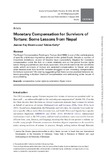| dc.contributor.author | Sharma, Jeevan Raj | |
| dc.contributor.author | Kelly, Tobias | |
| dc.date.accessioned | 2021-02-24T11:52:19Z | |
| dc.date.available | 2021-02-24T11:52:19Z | |
| dc.date.issued | 2018 | |
| dc.identifier.citation | Jeevan Raj Sharma, Tobias Kelly, Monetary Compensation for Survivors of Torture: Some Lessons from Nepal, Journal of Human Rights Practice, Volume 10, Issue 2, July 2018, Pages 307–326, https://doi.org/10.1093/jhuman/huy021 | |
| dc.identifier.uri | https://opendocs.ids.ac.uk/opendocs/handle/20.500.12413/16274 | |
| dc.description.abstract | The Nepali Compensation Relating to Torture Act (1996) is one of the earliest pieces of specific anti-torture legislation adopted in the global South. Despite a number of important limitations, scores of Nepalis have successfully litigated for monetary compensation under the Act, on a scale relatively rare on the global human rights scene. Using a qualitative case study approach, this article examines the conditions under which survivors of torture are awarded compensation in Nepal, and asks what lessons does this have for broader struggles to win monetary compensation for torture survivors? We end by suggesting that there can be practical tensions between providing individual financial compensation and addressing wider issues of accountability. | |
| dc.publisher | Oxford University Press | |
| dc.rights.uri | https://creativecommons.org/licenses/by/4.0/ | |
| dc.title | Monetary Compensation for Survivors of Torture: Some Lessons from Nepal | |
| dc.type | Article | |
| dc.rights.holder | © The Author(s) 2018. Published by Oxford University Press | |
| dc.identifier.externaluri | http://dx.doi.org/10.1093/jhuman/huy021 | |
| dc.identifier.ag | ES/L005395/1 | |
| dc.identifier.doi | 10.1093/jhuman/huy021 | |


